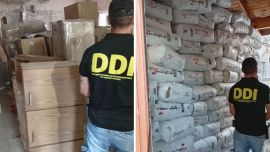Mauricio Macri and Donald Trump have a lot in common. Both were political outsiders who amassed large fortunes in the private sector and were elected with a mandate for change. They both love to golf and vacation in expensive resort towns. Both have been married several times and are currently in relationships with women several years younger, and they love a good deal. They consider each other friends and have even been engaged in business dealings before jumping into politics.
But despite having so much in common, politically and economically they seem to be at opposite sides of the table. While President Trump is pursuing an “America First” foreign policy that is heavy on economic protectionism, President Macri has been on a seduction mission that has taken him from Davos to Washington, from Moscow to Beijing, managing to snatch a G20 presidency while he’s at it. In the midst of such cordial relations, Macri even spoke with Trump on the phone on Friday, but it’s clear that Argentina is economically insignificant to the US, as Commerce Secretary Wilbur Ross has systematically unveiled policies that have caused harm to Argentine exports, disrupting at least as much as US$1.9 billion in trade which in turn will deteriorate an already spiraling trade deficit that hit its historic peak in 2017 and shows no signs of abating.
Lemons. “I’m going to be talking to him about North Korea, and he’s going to talk to me about lemons,” Trump said in a cheeky tone to reporters as he sat alongside Macri, Argentina’s First Lady Juliana Awada, and his wife, Melania, last August. That same month, the United States Department of Agriculture (USDA) cleared Argentine lemons to enter the US, meaning some 20,000 tons could make their way into the the States after being barred for 16 years, representing some US$50 million.
“Mauricio,” yelled Trump when he met Fernando Oris de Roa — Argentina’s new Ambassador to the US — this January. “Lemons, lemons, lemons,” he repeated, apparently unaware that Macri’s new Washington representative was a 27-year veteran of the lemon business. Oris de Roa’s mission is a difficult one. As he arrived, Secretary Ross had just confirmed anti-dumping duties on Argentine and Indonesian biodiesel, meaning the loss of approximately US$1.2 billion in annual exports for Argentina. The US was the primary source of Argentine biodiesel exports, which will now be redirected to the European Union after Argentina won a four year legal battle at the World Trade Organisation.
Oris de Roa will now have to fight for Argentina’s steel and aluminum business, after Trump unleashed unilateral tariffs on imports of both products in the name of national security. These represent annual exports of a little more than US$700 million for Argentina, which is the 37th “largest” goods trading partner with the US. The US is the world’s largest steel importer, yet Argentina isn’t even among its 10 largest sellers, and while Trump promised to consider whether to include the country among those exempted from the tariffs, it appears unlikely.
It’s impossible to get in Trump’s head, yet his protectionism reeks of cheap populism, very ineffective from an economic standpoint, as the cost of buying more expensive American aluminum promises to have negative consequences for aluminum-consuming industries and products (including beer cans). For Argentina, though, it is extremely painful. While the country doesn’t matter to Trump, the US is Argentina’s third-largest trade partner, only behind Brazil and China. As Argentina’s trade deficit in goods hit an all-time high of US$8.5 billion in 2017, US$3.1 billion of those came from the US (the trade deficit with Brazil totaled US$8.6 billion; it stood at US$7.7 billion with China). Roberto Lavanga’s consultancy estimates that Argentine GDP contracted 1.4 percent as a consequence.
It’s difficult to see how the Macri Administration will revert such a staggering figure, particularly when industries such as energy and autos — where the country’s been historically strong — are a big part of the problem. The unproductiveness of Argentine industry has kept exports at bay, and even the Federal Reserve’s strong-dollar policy hasn’t helped. Transport costs, a massive tax burden, rigid labour laws, and an unfavourable international economic environment will be a difficult obstacle for Macri and his Cambiemos (Let’s Change) ruling coalition. But hey, at least he’s got Trump in his corner.






















Comments